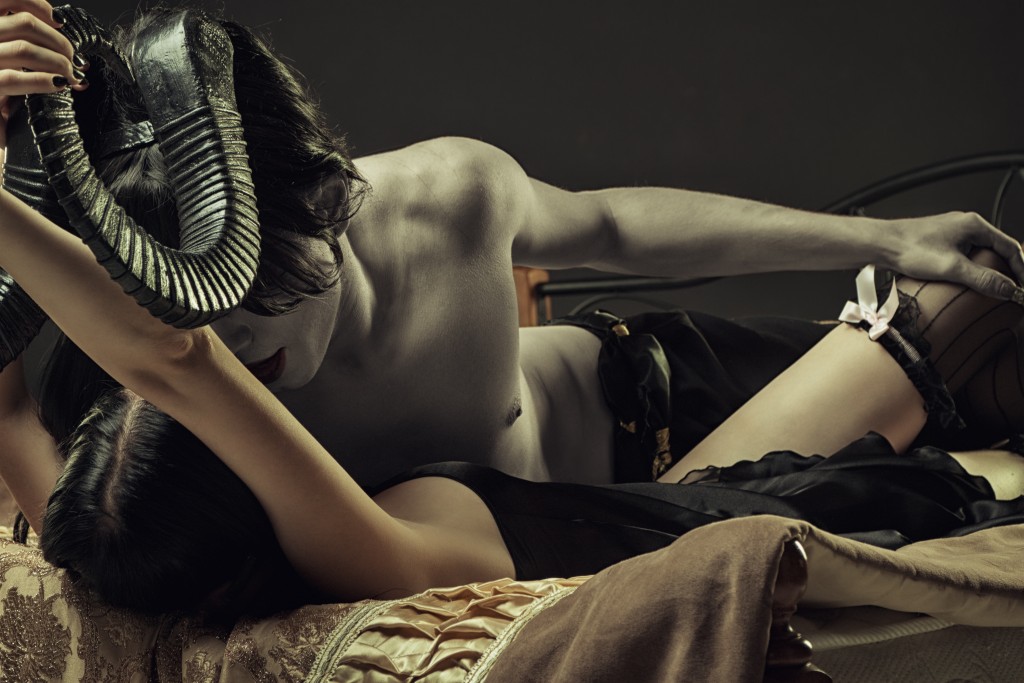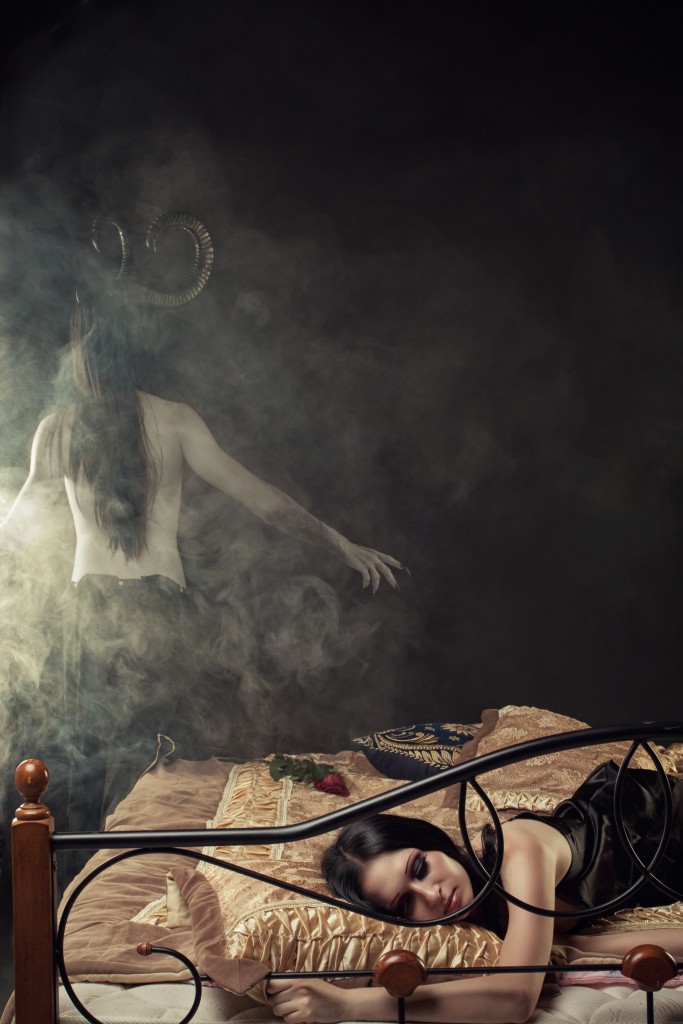Myth & Movie: 50 Shades of Persephone and Hades

Last weekend I asked my sister, who works as a counselor at a women’s shelter, if she wanted to see 50 Shades of Grey with me.
She looked at me like I had grown another head. “Honestly, no,” she sounded offended but patient, as though gently explaining to a three year old why it’s bad to hit people. “And we’re trying to discourage all the girls from seeing it, because it’s romanticizing DV.”
Wow, did I ever feel stupid.
I actually didn’t have a strong desire to see the movie. I haven’t read the book completely through, either. I can get erotica that’s better written and more hardcore for free online.
But I thought it might be a good idea to at least see it, because I was thinking of writing this article. So I stupidly invited my sister, the counselor of abused women, to go with me. Not one of my shining moments.
But I don’t need to have seen the movie or read the book to write this article. It’s not a review. It’s not about why Ana and Christian are a terrible example of a healthy BDSM relationship, or how the book and movie could hurt women who struggle with possessive, abusive partners.
I wanted to explore why 50 Shades of Grey is so popular in the first place.
There’s no doubt that 50 Shades of Grey, like its mother Twilight, has taken over the fantasies of women—despite its depiction of a disempowered woman who submits to physical and sexual abuse from a controlling, possessive man in the hopes that she can change him.
You’d think we would want to see more empowered depictions of our gender on the big screen.
And we do.
So why this sexy obsession with the opposite?
I think it goes a lot deeper than “It’s just a fantasy.” Or “Every woman wants to feel that wanted.” Or even “Every woman secretly wants to submit to an alpha male because of some cavewoman desire for the man with the baddest-assness.”
I think it’s because this story is a depiction of the Persephone journey.
The Persephone Archetype
Do you remember the story of Persephone? Here’s a quick rehash of it:
Persephone was a virginal young goddess. Hades was the god of the Underworld. One day, while Persephone was out picking flowers and going “la la la!”, the ground opened up and Hades appeared. He abducted Persephone and took her to the Underworld, ignoring her screams. However, her mother—the goddess of agriculture—was understandably pissed off, and brought on winter, causing all the crops to die. Zeus ordered Hades to return Persephone to her mother (so winter wouldn’t be of Westeros proportions), but unfortunately, Persephone had eaten some pomegranate seeds. Nobody who ate food in the Underworld could ever go home. But Hades found a loophole: Persephone would spend half the year with her mother, and half the year with him, as Queen of the Underworld.
A quick retelling of the story doesn’t really reveal how Persephone and Hades are Ana and Christian. Or Bella and Edward, for that matter.
The Persephone journey is about a naïve young woman who gets involved in a destructive and sexually abusive relationship. It brutally destroys the sweet innocent part of her that doesn’t know how to set healthy boundaries, and she becomes a better, stronger, more empowered version of herself—a Queen.

Let’s dig a little deeper into the myth.
By the way, Persephone’s name wasn’t always “Persephone.” When she was a girl, her name was Kora. That’s important because this journey is about transformation.
Kora is a maiden with no sexual experience. She’s a mama’s girl. She has no sense of personal power and doesn’t know how to set healthy boundaries. She’s not sexual herself, but every man wants her. Kind of like when Bella went to Forks and was suddenly The Girl Everyone Wanted to Take to Prom.
Hades shuns daylight is the god of the Underworld, and he’s rich. Very rich. Like Cullen or Grey rich. (This is symbolic of the personal treasures you can find if you have the courage to journey to your unconscious.) But Hades is also kind of a recluse and he’s lonely. Nobody wants to go to the Underworld on vacation, right? And he’s a real bitch about getting his way all the time.
He stalks Kora for awhile before abducting her and dragging her to his kingdom. She screams, “No!” She struggles. But Hades doesn’t let her go, and he doesn’t stop when she uses the safeword. He abuses her and assaults her.
Hades actively wants to hurt Kora. He makes no bones about this.
Edward actively wants to hurt Bella. He comes right out and tells her that he wants to kill her. It’s no coincidence that Edward is a vampire, essentially a god of the Underworld.
Christian actively wants to hurt Ana. He takes her to the Red Room of Pain (the Underworld—or at least, a room set apart from normal life, where a whole other world exists), where she thinks to herself, “He likes to hurt women. The thought depresses me.”
(In some versions of the story, Kora is traumatized and powerless. In other versions, she’s into this.)
Hades almost kills her.
Almost.
He feeds her vampire blood a pomegranate seed. And it’s just enough nourishment for Kora, lying near-dead and broken on Dr. Cullen’s table in the Red Room of Pain in a pit in the Underworld, to begin to revive. And as she revives, she is not the same girl who was abducted.
Hades sees that the woman rising is not the same person as the girl who went down, and he literally can’t abuse her anymore. It’s not possible. She is no longer the powerless creature that he could dominate. She has changed, grown, and there is no possible way to put her back the way she was.
This is when she changes her name to Persephone.
It doesn’t take long for Hades to realize that he LIKES HER MORE NOW.
Once Kora changes into Persephone, Hades is no longer interested in hurting her. Not that he could, anyway. She is his equal. He thought he wouldn’t like her this way . . . but he does.
Once Bella is a vampire, Edward’s no longer interested in hurting her. (Not that he could.) He thought he didn’t want her to be a vampire . . . but he likes her more this way.
Once Ana has done enough BDSM, Christian’s heart starts to open up and he becomes less interested in hurting her. He thought he wouldn’t enjoy this kind of equal relationship . . . but he’s happier this way.
So Persephone is now every bit as badass as Hades. She sees that just as she has transformed, so has he, and they develop a mutual respect and love for each other. They can now rule side by side as King and Queen of the Underworld.

Kora’s descent into the Underworld, where she transforms into Persephone, is symbolic of the powerless Feminine being transformed by the Masculine into a powerful goddess who can call herself Queen of the Underworld and rule as the god’s equal.
So why does this transformation have to look so abusive? Why does Christian have to hurt Ana?
Because it is a sexual death and rebirth.
Kora cannot transform herself. She’s not forceful enough, and she doesn’t have what it takes. (Bella can’t even hit a volleyball. How the heck is she going to become a vampire without Edward? What’s she gonna do—synthesize vampire blood in biology class?) Kora can only be transformed by death. In this case, it’s abduction and sexual abuse.
It has to be sexual. The Persephone journey is always darkly sexual. She’s been called the Underworld equivalent of Aphrodite. So that may be why women fan themselves over 50 Shades and Twilight. The myth is inherently sexual.
This is not a pleasant story.
It is not a fairy tale with a moral at the ending. It is not an example of how we should treat each other, or a love story about a healthy, redemptive relationship where two people save each other.
That’s not how myth functions.
Myth doesn’t show us the way things should be. It paints pictures of the way our psyches work. That can be some grimm (pun intended) nasty stuff. But because it paints pictures of the way our psyches work, it speaks to us on a very deep level. In myths, we see ourselves. When the Persephone myth keeps sweeping our culture, it makes me think that the culture as a whole just might be undergoing a Persephone journey.
The Persephone journey today
50 Shades of Grey’s popularity isn’t a sign that women secretly like to be controlled.
The Persephone journey is coming up in our culture right now because Feminine energy is gaining respect and power. The Feminine, which has been abused throughout history, is transforming into a more empowered version of itself. And the Masculine is transforming along with it, into something that does not need to oppress the Feminine.
An insightful blog post about the Hades and Persephone relationship puts it this way:
“A Hades-Persephone marriage is transformational. A couple that successfully uses this energy guides each other through life-changing experiences. They separate (possibly painfully) from the past. They mature together to higher states of personal growth.”
I hope that the very backlash against 50 Shades of Grey is a sign that the world is sick of Hades abusing Kora.
The backlash itself is part of the archetype, by the way. There’s always backlash against Kora’s abduction. Kora’s mother roamed the world and wept, railing against the gods who allowed it to happen and did nothing. Kora wept, crying out to be saved. Nobody saved her. (Not even Zeus, Helios, and Hecate, who saw the whole abduction.)
But the maiden Kora found her place as Queen of the Underworld. Bella found her place as a vampire. Ana found her place as Christian’s wife. And in our world, the Feminine is finding its place too.
At least, I hope it is. I could just be a naïve Kora wearing red tinted glasses. It’s probable that this archetype played a big role in the Eleusinian Mysteries of Ancient Greece, and the Ancient Greeks certainly didn’t give a hoot about feminism. So who knows?
***
Subscribe to future “Myth & Movie” posts! Scroll up and click “Subscribe” in the upper right corner of the website. Enter your email, select “Myth & Movie” and click “Subscribe.”
***
© Mythraeum 2016. The content of this article, except for quoted or linked source materials, is protected by copyright. Please contact me to request usage.
SUBSCRIBE
thank You – your timing is impeccable for my own journey which is a grand story of which you are now a part. A story which I hope to bring to the light of day to inspire many as it is funny intelligent Divinely Inspired and Totally True